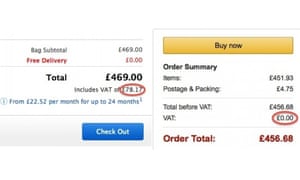Ist das ok für euch, wenn ich mal Artikel auf Englisch teile?
Amazon and eBay sellers’ VAT fraud rife despite crackdown
Guardian investigation finds goods such as iPads and laptops being sold tax-free

Huge numbers of VAT fraudsters are illegally selling goods tax-free to British shoppers on Amazon and eBay this Christmas, despite new government efforts to crack down on this ballooning £1bn VAT evasion crisis.
A Guardian investigation found a wide variety of popular goods being illegally sold without VAT on Britain’s leading shopping sites. They range from cheap Christmas tree lights, electric toothbrushes and thermal socks to expensive laptops, iPads, music keyboards, violins and pingpong tables.
In some cases, VAT fraudsters offer unbeatable prices. Mostly, however, their prices remain in line with law-abiding competitors and the proceeds of evasion disappear overseas, often to China.
Guardian investigations found many tax-evading sellers were trading without displaying VAT numbers on Amazon or eBay. Others were showing made up numbers, or numbers cloned, without authorisation, from unsuspecting legitimate businesses.
Several sellers purported to be operating through UK trading companies, but checks showed these firms had been dissolved, sometimes years earlier. None responded to questions about VAT.
HMRC estimates the explosion in VAT fraud on Britain’s shopping websites will cost £1bn to £1.5bn in lost VAT revenues this year, with much of it going missing in the current festive period.
By the end of “Cyber Monday”. UK shoppers will have spent £6.77bn on the web in a seven-day shopping binge that peaked on Black Friday, according to online retail association IMRG. The number of parcels ordered online will be up 12% on last year, it estimates.
The market for many goods is now dominated by overseas sellers. On eBay, for example, 40% of UK sales of Android phones are to firms registered in China. Meanwhile, Chinese-based companies account for more than 60% of sales of Christmas tree fairy lights on eBay.co.uk.
There is no suggestion that Amazon or eBay have themselves evaded tax, but critics claim they could make some basic changes – such as requiring sellers to display valid VAT numbers – that would help to stop their websites being used by many overseas companies as a platform for industrial-scale fraud.
Both eBay and Amazon insist that it is not their responsibility to police tax compliance among sellers. VAT rules are complex but the tax generally applies to most goods supplied from locations in the UK even if the seller company is incorporated overseas. Shoppers typically see prices that include VAT, charged on most goods at the standard rate of 20%.
Amazon told the Guardian: “Marketplace sellers are independent businesses responsible for complying with their own VAT obligations.” It added that Amazon does offer tools sellers can use to help with tax compliance, but “we don’t have the authority to review their tax affairs”.

EBay said it would pass information from the Guardian’s investigation to HMRC: “If we are informed by HMRC that a seller is not complying with requirements then we will take appropriate action.” A spokesperson said eBay “continually reminds” sellers of their need to comply with the law and had recently warned overseas firms of the UK government’s efforts to deal with VAT fraud.
After the Guardian first highlighted rife VAT evasion on online shopping sites, HMRC launched a series of warehouse raids, seizing £500,000 of goods. Months later, the then chancellor George Osborne gave tax inspectors new powers which he said demonstrated “firm action to protect the UK market from unfair online competition [from overseas VAT evaders]”.
Under the new rules, HMRC now has the power to issue Amazon and eBay with warning notices about suspected VAT fraudsters using their sites. If they then fail to take action, Amazon and eBay can be held liable for any VAT that later goes missing.
In reality, however, these changes have had little impact and VAT evasion remains widespread. A spokesperson for VATfraud.org, a campaign group set up by UK-based sellers, said: “Despite the new laws, HMRC have shown a woeful lack of action. There are many fraudsters who were reported to HMRC years ago but are still trading, and evading VAT, today.”
Guardian investigations found Amazon even offering extensive support services at its British warehouses to overseas sellers that were doing little to mask their VAT evasion.
As well as advertising these sellers’ goods on Amazon.co.uk, it holds items in Amazon UK warehouses, arranges delivery to addresses across Britain, and deals with complaints and returned goods.
Amazon warehouse staff even offer gift-wrapping services on behalf of the fraudster sellers.
There is no suggestion Amazon or eBay knowingly facilitate specific fraudulent VAT-free sales, but the two US groups are nevertheless well aware that evasion in online shopping is a major problem.
Meanwhile, the sellers themselves are often based overseas, with little or nothing known about their UK sales activities by HMRC.

One such seller, a company based in Dubai, offered an iPad Air 2 for sale on Amazon.co.uk.
The iPad was sold at £456.68, which was a similar price to that on offer at Apple’s own online store. However, the Apple store price included a £78.17 VAT charge while the Dubai-based Amazon seller charged no VAT at all.
Asked for a VAT receipt, the iPad seller said in an email: “We don’t supply UK VAT receipt, sorry.”
Many sellers contacted by the Guardian were similarly open about not charging VAT. “Thank you for your letter and sorry to tell you we do not have UK VAT receipt. We are located in China,” said one. “Our VAT is still in the application,” said another.
A third seller even offered to cut a deal, offering to share part of the proceeds of the VAT fraud. “If you want the VAT receipt, it will be after your purchase a week later. Otherwise, we will offer some discount to you directly,” the seller said in an email. “Looking forward to your reply.”
(Artikel zuerst erschienen bei The Guardian)






